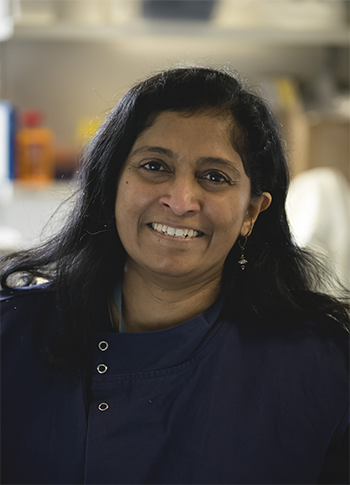Dr Meera Unnikrishnan awarded over £2 million for research into C. difficile infection
Associate Professor Meera Unnikrishnan from the Division of Biomedical Sciences has been awarded a Wellcome Discovery Award from the Wellcome Trust to the value of £2,225,509. Her project, ‘Dissecting Clostridioides difficile-host-commensal interactions at the gut interface’, will take place over eight years. We caught up with her to find out more.

Congratulations on your award! Can you tell us more about what this project is about?
Sure! Our guts contain a barrier formed by mucus, gut cells and the microbiota. This barrier contains commensals, the ‘good’ bacteria, which protect us from bacterial pathogens. However, sometimes certain pathogens can overcome these defences, establish themselves and cause an infection.
This project is going to be looking at the three-way interactions between a pathogen – in this case C. difficile, the host (our own cells) and the commensals. The idea is to understand better at a single-cell level what’s happening at the gut-microbial interface. We want to understand how C. difficile establishes itself in the gut, how it overcomes commensal and host defences.
How will you do this? What are the main challenges you expect to encounter?
We’ll be engineering an innovative system that will allow us to do these single-cell studies. We’re going to make a colon-on-a-chip that will mimic the gut, along with synthetic communities of bacteria that will mimic the gut microbiota. This will allow us to track how the pathogen interacts with the host and the microbiota, and further identify proteins key for these interactions.
One of the reasons why research in this area is lacking is because of a lack of systems with the right environmental controls. The bacteria in the gut and C. difficile can’t survive in oxygen, while the gut cells need oxygen, so we need better dual-environment systems to study interactions. And yes, this is challenging project, but with our experience in this area we are confident we can get this done!
Why did you choose to focus on C. difficile?
We’re focusing on C. difficile because it’s a highly antibiotic-resistant pathogen that causes severe diarrhoea. Recurring infections are a huge clinical problem. You would usually get C. difficile infection if you’re on long-term courses of antibiotics - these antibiotics would affect your microbiota. It is commonly seen in elderly people, and in patients on long-term medications in hospital. Although the focus of the work will be on C. difficile, we hope that the tools we develop will enable us to study other pathogens in the future.
How will this research benefit people?
We need a deeper understanding of the cellular interactions between commensal bacteria and C. difficile, to design and develop better cocktails of gut bacteria (microbiome-based therapeutics) against C. difficile infections. The hope is that people could take such cocktails while on long-term antibiotics to prevent gut infections.
Currently, because C. difficile is so highly resistant, one has to resort to treatments like faecal microbiota transplantation (FMT), which restores the healthy microbiota. Although effective, there are safety concerns associated with FMT. So we hope that our project will help develop alternative safe treatments.
Who will be in the team?
I’ll be joined by three postdoctoral fellows and a research assistant. We’re hoping that they’ll be in post and ready to start the project by February 2024.
How are you feeling about the award?
I’m extremely pleased, particularly because it’s not just a significant amount of funding, it’s long-term funding. I am really thankful to the Wellcome Trust for supporting our research and to all my collaborators on this project. This grant will allow us to answer some exciting research questions - and I’m really looking forward to it!
